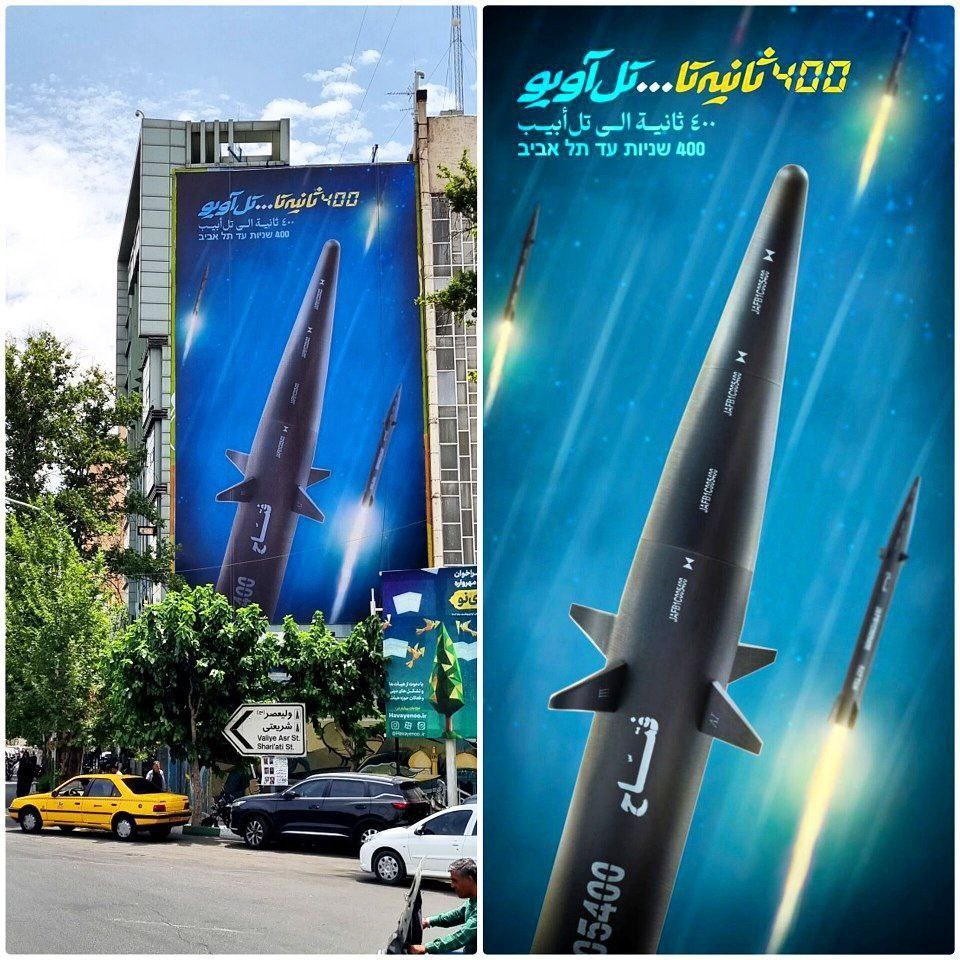Iran has erected a provocative billboard in Tehran featuring the Fattah hypersonic missile and a chilling message that reads, “400 Seconds to Tel Aviv,” directly threatening Israel’s largest city.
Chinese ‘Tiger’ Roars In Ukraine War; Pro-Russia Troops Flaunt Chinese Military Vehicles For SMO
On June 7, following Iran’s unveiling of its purported domestically produced hypersonic missile, a billboard showcasing the Fattah hypersonic missile emerged on the streets of Tehran.
This billboard, carrying a menacing message in both Persian and Hebrew, attempts to intimidate Israel, intensifying the already volatile situation in the region.
Iranian President, Ebrahim Raisi, attended the unveiling ceremony of the Fattah (‘Conqueror’) missile, which is claimed to have a range of 870 miles (1,400 kilometers) and the capability to travel at speeds up to 15 times the speed of sound.
With its purported ability to bypass air defense systems, Iran asserts that the Fattah missile can strike any region in Israel.

According to Iran’s state TV, the newly unveiled hypersonic missile can bypass even the most advanced anti-ballistic missile systems of the United States and the “Zionist regime,” including Israel’s Iron Dome defense system.
In line with the message on the banner, Commander of the IRGC Aerospace Force Brigadier General Amir Ali Hajizadeh stressed during the unveiling ceremony on June 6 that the Fattah missile can reach Tel Aviv in a mere “400 seconds.”
Tehran has a track record of issuing such threats, as was evident in November 2022 when Iranian military forces voiced similar warnings after announcing their successful development of a hypersonic ballistic missile capable of maneuvering within and outside the atmosphere.
At the time, Iran’s publication Sobh-e-Sadegh, allegedly linked to the Revolutionary Guard, similarly threatened Israel by implying that their new hypersonic missile could reach the country in just 400 seconds.
Taking into account the geographical distance of approximately 1000 kilometers separating Iran’s Kermanshah Province, which shares a border with Iraq, and Tel Aviv, Israel’s largest city, the assertion made by Iran of a 400-second timeframe to strike the Israeli metropolis implies a missile speed of approximately Mach 7 or seven times the speed of sound.
A Major Threat To Israel?
Hypersonic missiles, capable of reaching speeds of at least Mach 5, or five times the speed of sound, are known for their incredible velocity and maneuverability, making them highly challenging to intercept.
The high speed and maneuverability of hypersonic missiles can indeed create a sense of insecurity for rival nations regarding the effectiveness of their existing security measures.
Amir Ali Hajizadeh, the commander of the aerospace forces of Iran’s Revolutionary Guards, hailed the Fattah missile as “a missile that is unique in the world.”
While Iran has not provided details of an actual missile launch, Hajizadeh explained that a ground test of the missile’s engine was conducted. This ground test involved firing the rocket motor while placed on a stand to assess its capabilities.
Israeli experts believe that Tehran has not yet fully developed the hypersonic missile. However, if successfully developed, they acknowledge that such a weapon could pose a significant threat to Israel.
These experts also highlight the growing defense cooperation between Russia and Iran, particularly in light of the ongoing conflict in Ukraine.
They speculate that this collaboration could potentially lead to Moscow providing vital technical knowledge regarding hypersonic missile technology to Tehran. Such assistance from Russia could expedite Iran’s progress in this field, amplifying concerns over the potential capabilities and implications for Israel’s security.
Meanwhile, in response to Iranian claims of developing a new hypersonic missile, Israeli Defense Minister Yoav Gallant dismissed the assertions, saying that Israel would always possess countermeasures to address any such threat effectively.
Despite the heightened tensions surrounding Iran’s nuclear program, Gallant expressed confidence in Israel’s ability to maintain its defensive capabilities and effectively mitigate any potential risks posed by the purported missile development.
“I hear our enemies boasting about weapons they are developing. To any such development, we have an even better response — whether on land, in the air, or the maritime arena, including both defensive and offensive means,” Gallant said.
Nonetheless, in addition to the reports of new missiles and provocative banners in Iran’s capital, these developments coincide with Israel’s concerns about the possibility of the Western world engaging in new negotiations with Tehran to revive the stagnant nuclear deal governing Iran’s civilian nuclear program.
- Contact the author at ashishmichel(at)gmail.com
- Follow EurAsian Times on Google News